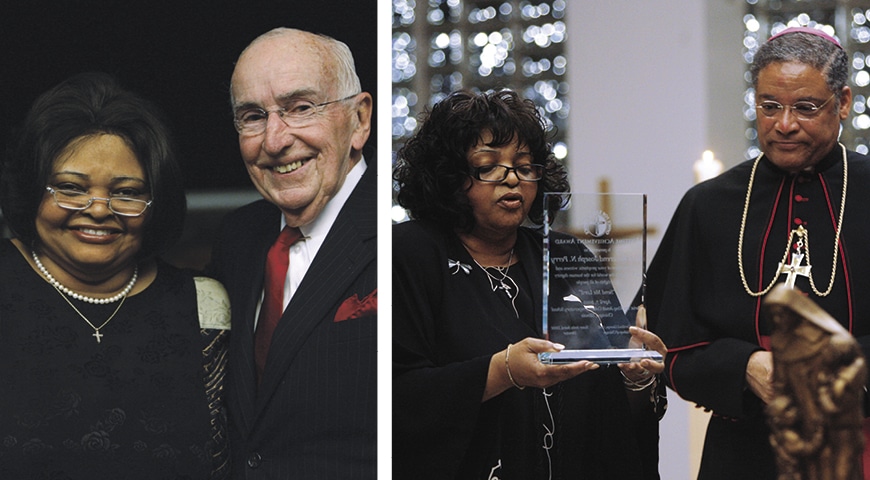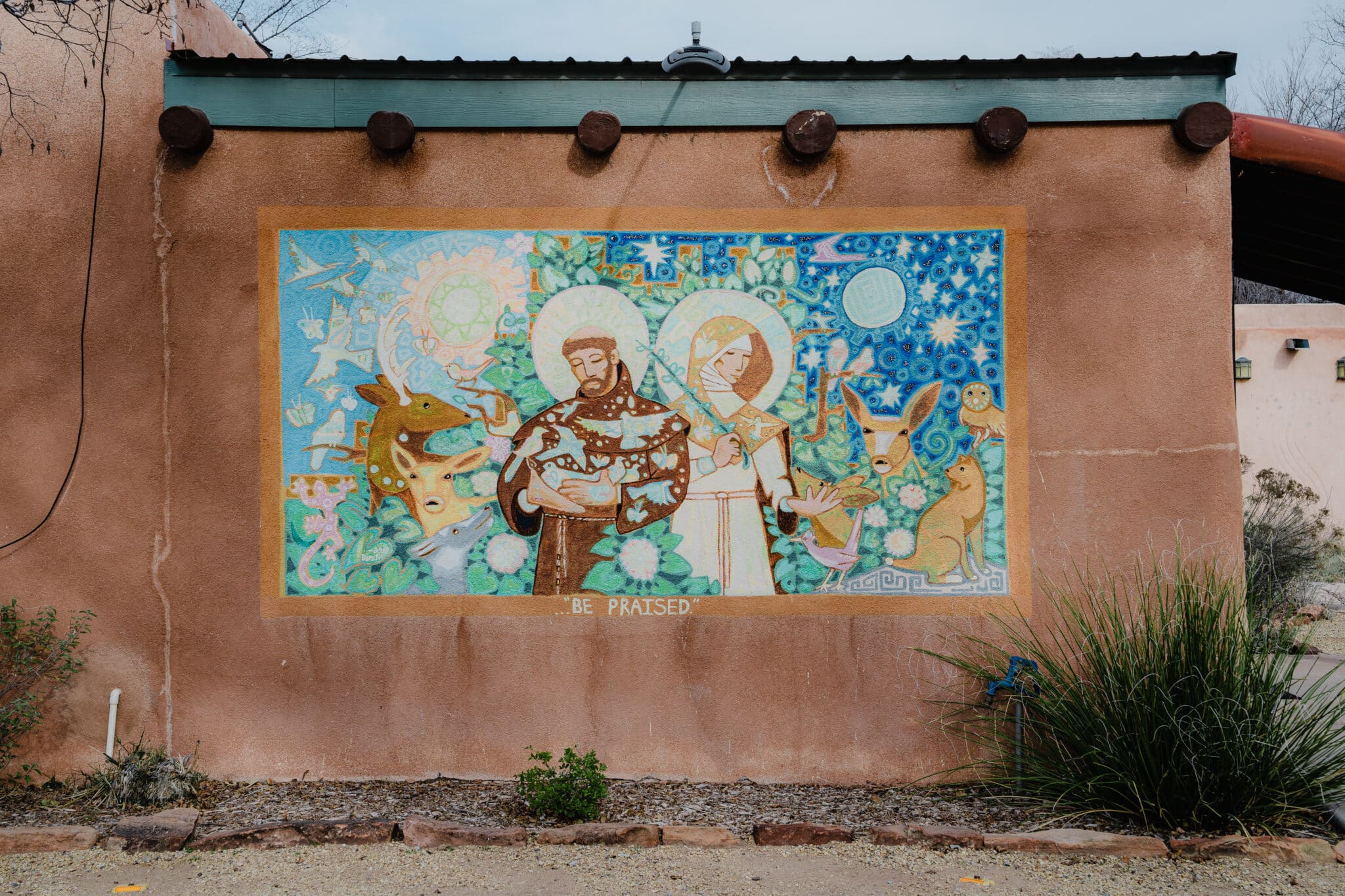Sister Anita Baird wants to make sure that every person’s vote matters, especially those in the minority.
Sister Anita Baird, a Daughter of the Heart of Mary, has never been afraid to speak up when it comes to tough topics, especially those related to racial justice. For over 20 years, she has been working to achieve the reality “that all men are created equal” on behalf of those for whom that statement doesn’t necessarily always ring true.
These days, Sister Anita is speaking out about an issue that she says is a fundamental human right but remains challenging for many. That issue is the struggle minorities face when it comes to their voting rights and the concerns surrounding those rights. It is, she says, “a pro-life issue.”
“When you take away people’s power to voice their choices to protect their rights, it has a spiraling impact,” she explains. “It’s not just voting in the booth, but when you talk about systemic issues, when you look at housing, when you look at education, when you look at health care in the midst of COVID-19, we see how unequal access is for people of color. And I think that’s why it’s so important for us to be aware that it’s not just simply casting your ballot, but how it impacts communities that have been disadvantaged for hundreds of years.”
Sister Anita believes the beginning lines of the Declaration of Independence that “all men are created equal, that they are endowed by their Creator with certain unalienable Rights” are some of the most powerful words ever written. She points out, though, that when they were written, they did not really include everyone. The writers, she says, “owned slaves, and they did not consider them full human beings. Women were not included and poor Whites who did not own property were not included. So it was a very narrow frame of ‘all men are created equal.'”
And while such challenges now affect primarily people of color, she believes that over time it will begin to affect others too.
Years of Work
Sister Anita’s work for racial justice goes back decades. In 2000, she was named founding director of the Office for Racial Justice for the Archdiocese of Chicago by the late Cardinal Francis George. Her role was to direct archdiocesan initiatives to eradicate racism in its structures and institutions. She also served as Cardinal George’s liaison for race relations to the city of Chicago.
She has served as her community’s regional superior, provincial councilor, and as its first Black US provincial. She was president of the National Black Sisters’ Conference from 2001 to 2003.
In 1998, Sister Anita was awarded the Harriet Tubman award from that conference. The yearly award honors one of its members who, through her ministry, is an advocate for Black people and has a strong identity within the Black community.
At the time, she told Global Sisters Report that there is a clear difference between racial equality and racial justice, noting that having only equality and not justice would be as if the Catholic Church’s response to the sexual abuse crisis was to promise it wouldn’t happen again.
In both cases, she says, justice is needed, not simply statements or a desire to move forward. “It took until 1979 until the bishops finally acknowledged racism as a sin,” says Sister Anita, referring to the bishops’ pastoral letter “Brothers and Sisters to Us.”
In 2018, the bishops once again took up the issue of racism with their pastoral letter titled “Open Wide Our Hearts: The Enduring Call to Love. ” In it, they stated: “As bishops, we unequivocally state that racism is a life issue. . . . We have also seen years of systemic racism working in how resources are allocated to communities that remain de facto segregated.”
When Sister Anita became the first Black woman to win the Outstanding Leadership Award from the Leadership Conference of Women Religious (LCWR) in 2018, she told the conference that racial justice in the Catholic Church will take “more than just singing ‘Kumbaya.'”

LEFT: George O’Hara, accompanied by Sister Anita, was one of the founding members of the Archdiocese of Chicago’s anti-racism team. RIGHT: Sister Anita presents Chicago’s Auxiliary Bishop Joseph N. Perry with the St. Katharine Drexel Racial Justice Award in 2010. Photo credit: photos courtesy of Sister Anita Baird
The Importance of Speaking Up
When asked why Catholics should care about this issue, she says it’s not only Catholics. “I don’t know how any Christians can turn a blind eye to the situation, just in terms of the dignity of the human person and the rights that every human being has to live decently and have access to just basics,” she adds.
Sister Anita says that, as Catholics, “we have to follow the mandate of Jesus. It’s very basic.”
Unfortunately, though, she believes the Catholic Church has been co-opted into the current political frenzy and has not spoken out enough. That voice has been silenced, she states, adding that the bishops are not addressing the issues that are at the heart of people’s daily lives.
Minorities often face challenges when voting. In recent years, a number of states have instituted laws that many feel lead to voter suppression. In response, the John R. Lewis Voting Rights Act was introduced to Congress. The purpose of the bill is to make voting more accessible and easier for citizens. It addresses issues such as voter registration and voting access, election integrity and security, redistricting, and campaign finance.
The bill was passed by the House in August 2021, but since moving to the Senate it has languished. Sister Anita says that speaks to the division we are facing in our nation. “The whole thing is about winning,” she notes. “It’s sad to see, especially because he was one of their colleagues.”
In response, on Martin Luther King Jr. Day in 2021, the Black Sisters’ Conference, of which Sister Anita is currently the vice president, joined with the LCWR in issuing a statement regarding the sacred right to vote. In it, the sisters pointed out that “the strength and vibrancy of our democracy is dependent on the right of all people to vote regardless of their race, zip code, economic status, or party affiliation.”
Citing the long history of racism with voting rights, the sisters stated: “Our brothers and sisters struggled, some gave their lives, to secure the Voting Rights Act of 1965. It falls to us to continue their work. Pope Francis reminds us in ‘Evangelii Gaudium’ that our vocation as Catholic sisters is inherently political: ‘We are all called to participate in public life. . . . Authentic faith always involves a deep desire to change the world. . . . We cannot remain on the sidelines in the fight for justice.'”
A Resurrection People
But Sister Anita has hope, and she points out that by the middle of this century, people of color will be in the majority in the United States.
Therefore, she says, steps to make voting more difficult in communities of color, often in lower income neighborhoods, “may backfire. I think sometimes when you push people back against the wall, it gives them more energy. If you tell people they can’t do something, it often gives them the courage and incentive to prove you wrong. There’s always a way around. But I think people have to be motivated and energized.”
Hope is something that as Christians we must continue to have, Sister Anita says. “As dark as these days may seem, I think back to my ancestors, who came over on those slave ships and were separated from family, lost their language, their identity, lived under the brutality of the whip for hundreds of years without seeing an end to it. Somehow, though, they never lost hope, and they never lost trust in God.
“So if they could endure that, certainly I have no right to lose hope today. Much progress has been made. That is very true. We just have to stay the course. As people of the Gospel, we have to believe that, in the end, truth and justice will prevail.”
Moses got to the Promised Land, Sister Anita points out. He wasn’t able to cross into it, but his people did. Similarly, she says, quoting the Rev. Dr. Martin Luther King Jr., even though we haven’t made it yet, in time, “We will get to the Promised Land.”
Sidebar: Key Terms
Two terms that are often bandied about when discussing voting rights are redistricting and gerrymandering. Not everyone knows or understands what those terms mean or what their implications are for voters, though. Here is a brief overview.
Redistricting (Redistribution). This is the way in which electoral districts are added, removed, or otherwise changed. This complicated process occurs every 10 years and is based on census numbers. Once those numbers are released for all 50 states, seats in the US House are handed out accordingly. Through the process, some states will gain or lose seats. Some will keep the same number of seats. Regardless of how the number of seats plays out, though, new districts for congressional and state legislative seats must be drawn to create districts that are equal (or as close as possible) in population.
Where those lines are drawn is often left up to the state legislature. Some states, however, have created commissions‚Äîsuch as a citizens’ commission in California‚ to do the work and thus avoid having elected officials involved in the process. At times, redistricting plans can end up having to be decided by the courts.
Critics argue that the process has been used to neutralize minority voting power. Supporters, however, say that the process enhances electoral competitiveness.
Gerrymandering. When district lines are drawn to benefit one candidate or party over another, that is known as gerrymandering. According to the website FairVote.org, the practice is usually legal but can be challenged. What can be illegal, however, is racial gerrymandering, “which originally referred to manipulating legislative district lines to under-represent racial minorities. Tactics such as ‘packing’ Black voters into a given district or ‘cracking’ them to make Black voters a minority in all districts can be illegal. This sort of gerrymandering was first used in the South after the Civil War to dilute the Black vote.”
The practice is named after Massachusetts Governor Elbridge Gerry, who in 1812 submitted to the state Senate a redistricting plan that would have concentrated the voting strength of the Federalist Party in just a few districts, thereby giving disproportionate representation to the Democratic-Republican Party.
Some of Governor Gerry’s new districts were oddly shaped, with one resembling a salamander, thus giving rise to the term gerrymandering.








